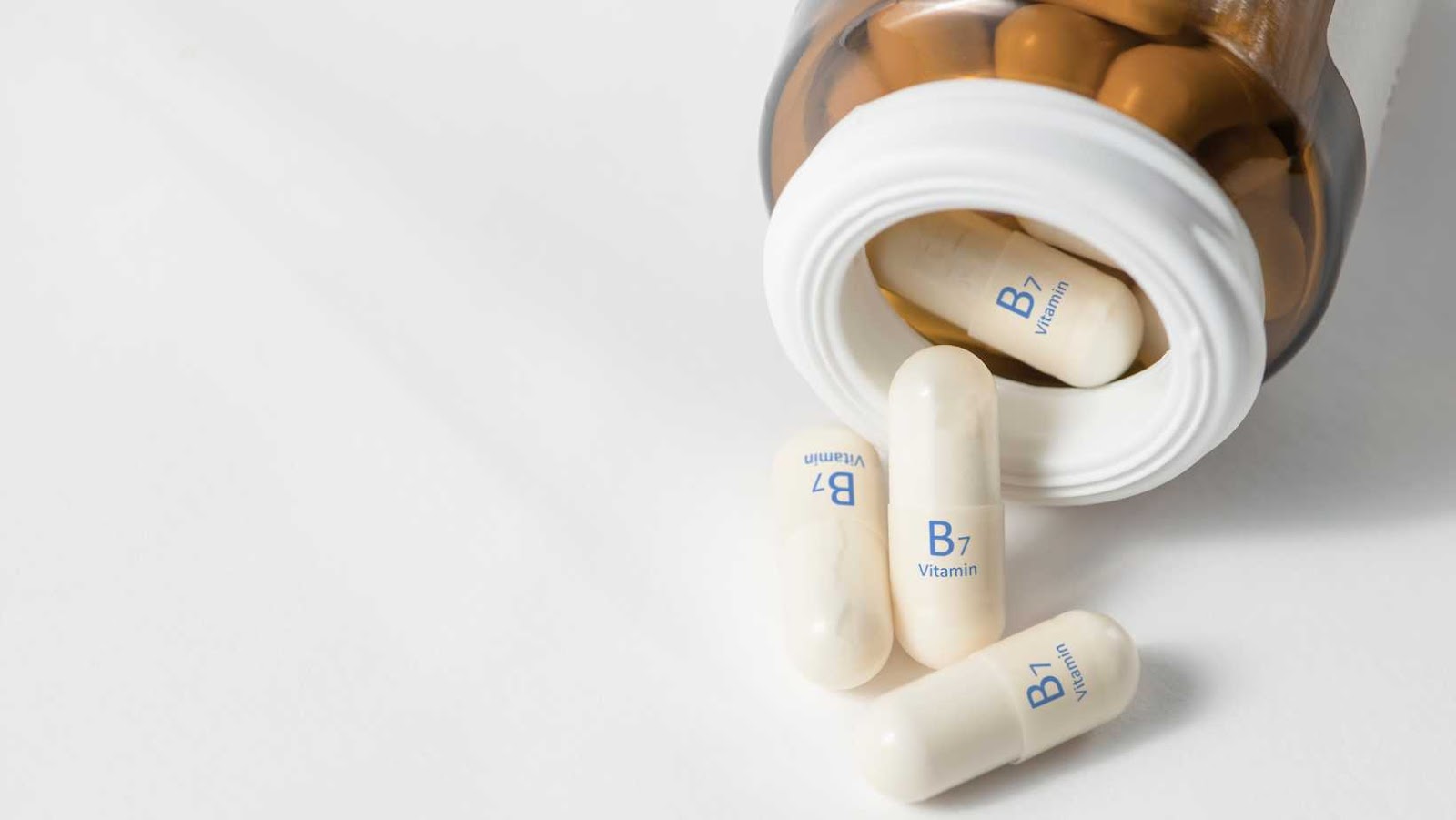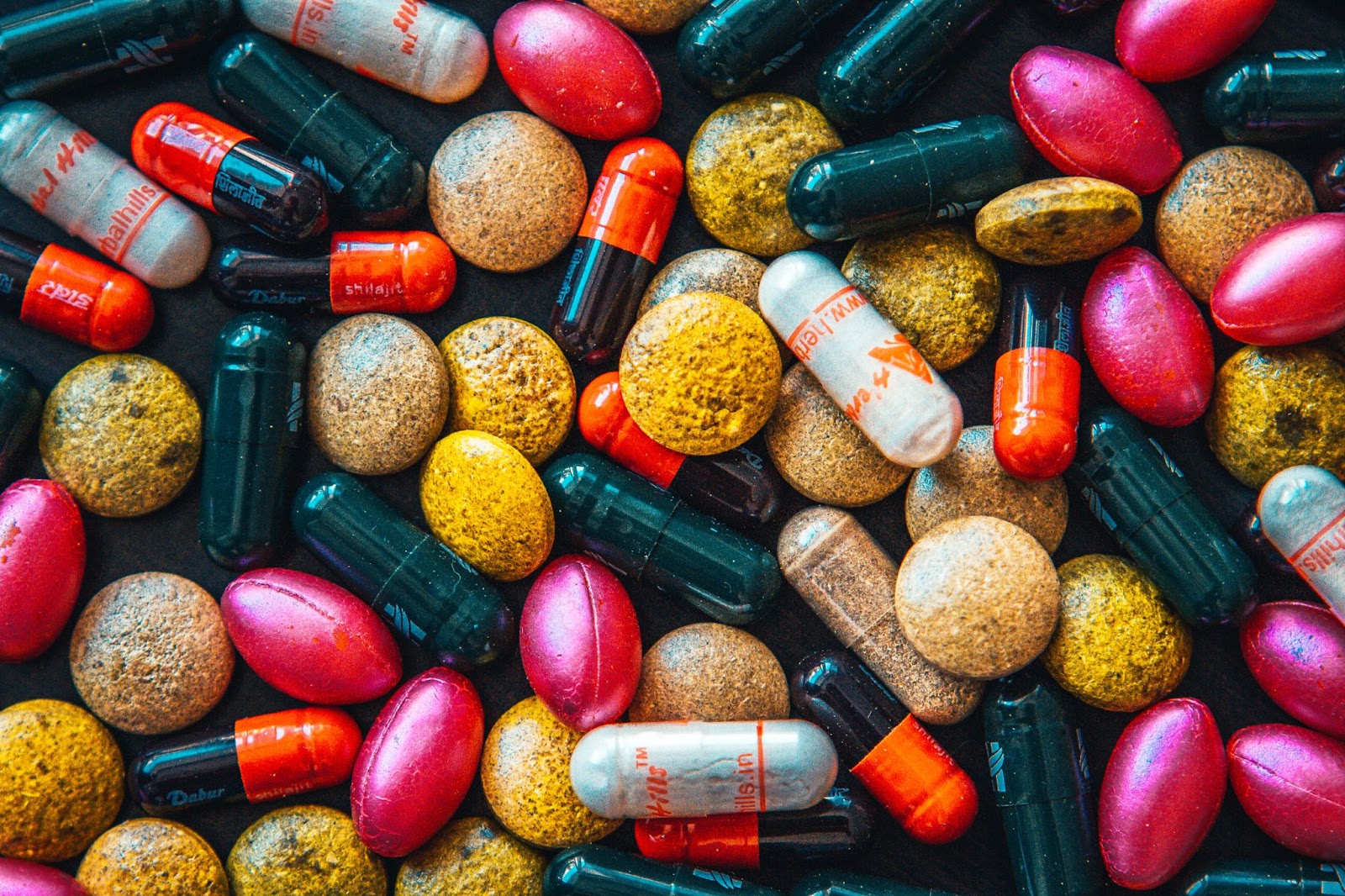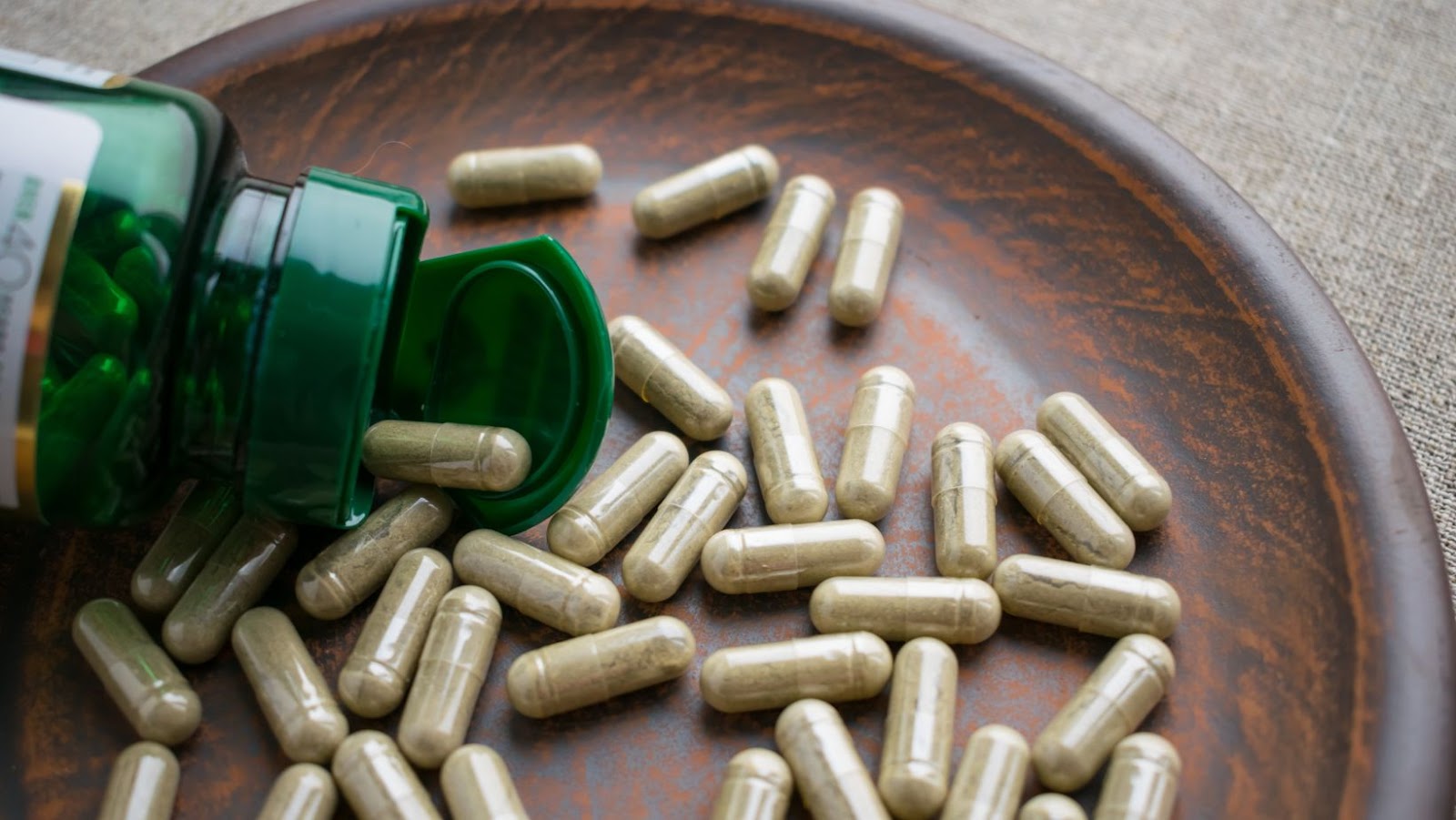Biotin is essential for healthy hair, skin, and nails, but taking it in large doses can cause side effects. Biotin is considered safe when taken in recommended doses, but high doses may lead to adverse effects.
Here are some of the side effects of biotin:
| Number | Side effect |
| 1 | Acne breakouts |
| 2 | Allergic reactions |
| 3 | Interference with lab tests |
| 4 | Miscarriage or impact on breastfeeding |
| 5 | Upset stomach |
To avoid these side effects, it is essential to consult with a healthcare provider before taking any biotin supplements. Additionally, it is important to follow dosage recommendations carefully and buy supplements from well-reputed sources. Pro tip: A balanced diet full of vitamins and minerals can also help prevent the need for supplements.
What is Biotin?
Biotin, also known as Vitamin B7, is an essential water-soluble vitamin found naturally in certain foods. Biotin is often used as a supplement to support healthy nail and hair growth, but its potential benefits are not limited to these cosmetic uses. Many people take biotin supplements to support healthy metabolism and cognitive functions.
In this article, we will take a closer look at how biotin works and if it could possibly have any adverse side effects.
Biotin Benefits
Biotin is a water-soluble B vitamin that is essential for maintaining healthy skin, hair, and nails. It also plays a crucial role in the metabolism of carbohydrates, fats, and proteins. Biotin deficiency can cause hair loss, scaly skin, and brittle nails. However, taking high doses of biotin supplements can cause side effects such as skin rashes, acne breakouts, digestive upset, and interference with laboratory test results. It’s important to consult your doctor before taking any biotin supplement and to follow the recommended dosage. Some common dietary sources of biotin include liver, egg yolk, dairy products, nuts and seeds, and green leafy vegetables. While it is unlikely to experience biotin deficiency from dietary sources, it’s always a good idea to maintain a balanced and nutrient-rich diet.
Sources of Biotin
Biotin, also known as vitamin B7, is an essential nutrient that helps the body convert food into energy. It is commonly found in a variety of food sources and can also be taken as a supplement, but there are some side effects of taking too much biotin.
Here are some excellent food sources of biotin:
| Food Source | Biotin Content |
| Egg yolks | One large cooked egg yolk contains around 10 micrograms of biotin. |
| Nuts and seeds | Almonds, peanuts, walnuts, and sunflower seeds are rich in biotin. |
| Sweet potatoes | One medium baked sweet potato can provide up to 29 micrograms of biotin. |
| Spinach | One cup of cooked spinach contains around 7 micrograms of biotin. |
Some of the side effects of taking too much biotin include acne, skin rash, and digestive issues. However, it’s rare to consume too much biotin from food alone.
Pro tip: It’s always best to get your nutrients from a balanced and varied diet rather than relying solely on supplements.

Recommended Dosage
Biotin is a water-soluble vitamin that is part of the vitamin B complex. It is essential for healthy skin, hair, and nails and plays a vital role in converting food into energy. The recommended dosage of biotin for adults is 30 mcg per day. However, some people take biotin supplements in higher doses to promote hair growth or treat certain medical conditions. There are mainly no side effects of biotin, but high doses of biotin can interfere with laboratory tests and skew results, causing inaccurate readings. Therefore, it is important to check with a healthcare professional before consuming high doses of biotin or taking any dietary supplements. So, always consume biotin supplements in moderation to avoid any adverse effects, and consult your healthcare provider for proper guidance.
How Long Does Biotin Take to Work?
Biotin is a popular supplement due to its many potential benefits. It is known to help increase hair and nail growth, as well as support healthy skin. But when it comes to taking biotin for its benefits, you may be wondering how long does it take to work?
Let’s explore this and discuss the potential side effects of biotin, so you can be sure you are taking it safely and effectively.
Factors Affecting How Long Biotin Takes to Work
The effectiveness of biotin and how long it takes to work can be influenced by different factors, such as current biotin levels, dosage, and individual metabolism. Biotin is responsible for the growth and maintenance of hair, skin, and nails, and a deficiency can lead to brittle nails and hair loss. While it is recommended to take 30-100 mcg of biotin per day, the timing of the supplement also plays a role in its effectiveness. Moreover, everyone’s body processes biotin differently, and some may see faster results than others. It’s essential to note that biotin supplements do not provide overnight results and may take several weeks or months to notice an improvement. Lastly, while biotin is generally safe, it can cause side effects such as skin rash, acne, and digestive issues in some individuals. It’s recommended to consult a doctor before starting to take biotin supplements to determine the right dosage and to discuss any potential side effects.
Signs of Biotin Deficiency
Biotin deficiency is a rare condition that can cause a range of symptoms. Here are some of the signs of biotin deficiency:
| Hair loss, thinning hair, and brittle nails are common symptoms of biotin deficiency, as biotin is essential for healthy hair and nails. |
| A red rash around the mouth, nose, and eyes may also be a sign of biotin deficiency. |
| Nervous system problems, including depression, lethargy, hallucinations, and numbness or tingling in your extremities, may indicate severe biotin deficiency. |
Biotin supplements can be effective in treating biotin deficiency. However, it is important to note that biotin supplements may take several months to start working, and there may be side effects such as acne, digestive issues, and allergic reactions for some individuals. It is recommended to consult with a healthcare provider before starting any new supplements, including biotin.
Can Biotin Cause Hair Loss?
Biotin has been celebrated as a hair growth supplement, but can it actually cause hair loss? The answer is no, biotin in itself does not cause hair loss. Rather, it is an essential nutrient for healthy hair, skin, and nails. However, there have been instances where biotin supplements have caused breakouts, particularly in those prone to acne. This is because biotin interferes with the body’s natural processes, leading to an overproduction of sebum, which can clog pores and cause acne. It’s important to note that biotin won’t work overnight, and it may take several weeks or even months to see results, particularly if there are underlying deficiencies at play. If you’re considering taking biotin for hair loss or other benefits, it’s best to consult with a healthcare professional to determine the right dosage and to discuss any potential side effects.
Side Effects of Biotin
Biotin, also known as Vitamin B7, is an essential nutrient most commonly used for strengthening hair, skin, and nails. While it is generally considered safe and people who have been taking it have not typically reported any side effects, it’s important to look into the potential risks and adverse reactions that may occur. This article will explore the possible side effects of biotin and how long it can take for the effects of the supplement to be seen.
Allergic Reaction
Biotin is a water-soluble vitamin essential for maintaining healthy hair, skin, and nails. However, excessive intake of biotin supplements can cause allergic reactions in some individuals.
| The common symptoms of biotin allergy are: |
| 1. Skin rash or hives |
| 2. Swelling of the face, lips, or tongue |
| 3. Difficulty breathing or swallowing |
| 4. Upset stomach, nausea, or diarrhea |
If you experience any of these symptoms after taking biotin supplements, seek medical attention immediately.
Pro Tip: Always consult a healthcare professional before adding any new supplements to your diet.

Skin Rash or Acne
While biotin supplements are generally safe, they can cause skin rash or acne in some people, especially when taken in high doses. Biotin is a water-soluble B-vitamin that helps the body convert food into energy. It is commonly used to strengthen hair, skin, and nails, and promote healthy growth. However, excessive intake of biotin can cause several side effects, including acne and skin rash. This is because biotin can alter the bacterial balance in the gut, leading to inflammation and breakouts on the skin.
To avoid skin rash or acne caused by biotin supplements, it is essential to take them in moderation and under the guidance of a healthcare professional. It is also advisable to drink plenty of water and maintain good hygiene to reduce the risk of bacterial infection on the skin.
| Pro tip: | If you experience any adverse effects after taking biotin, consult your doctor and stop taking it immediately. |
Digestive Problems
Biotin is a water-soluble vitamin that is essential for proper body functioning, particularly for healthy skin, hair, and nails. However, consuming excess biotin can lead to some digestive problems.
Biotin is widely used as a dietary supplement, and while it is considered safe, it can have side effects when consumed in large doses. Some people may experience digestive problems such as:
- Stomach pain and cramping
- Nausea and diarrhea
- Increased thirst and dehydration
It is important to stick to the recommended biotin dosage, which is typically between 30 and 100 micrograms per day. Additionally, biotin is found in many foods, including egg yolks, nuts, and whole grains, so it is possible to get enough biotin from a balanced diet alone.
Pro tip: If you are experiencing digestive problems due to biotin supplements, lower the dosage or discontinue use and consult a healthcare professional.
Risk of Overdose
Biotin is a B-vitamin supplement that can have powerful health benefits like stimulating hair growth, nail growth, and improved skin health. However, taking too much biotin can be dangerous and come with a range of side effects.
In this section, we’ll discuss the potential risks of taking too much biotin and how long it takes for biotin to start working.
Symptoms of Biotin Overdose
While biotin is considered safe and essential for normal body function, taking high doses of biotin may lead to biotin overdose, which can cause several unwanted and sometimes severe symptoms.
| Symptoms of biotin overdose include: |
| – Skin rash |
| – Acne |
| – Insomnia |
| – Nausea |
| – Dizziness |
| – Digestive issues |
| – Abnormal heart functioning |
If you experience any of these symptoms after taking biotin supplements, consider reducing your dosage or stopping the intake altogether. Consult your doctor if the symptoms persist or worsen.
Pro tip: Always consult a healthcare professional before taking high doses of biotin or other supplements to avoid the risk of overdose or drug interactions.
Can Biotin Overdose be Fatal?
Biotin is a water-soluble vitamin that is essential for our body in several ways, including the growth and maintenance of healthy hair, skin, and nails. While biotin is usually safe and has no known side effects when taken in recommended doses, biotin overdose can have potentially life-threatening consequences.
An overdose of biotin can occur when taking high doses of supplements or consuming a large amount of biotin-rich foods. Symptoms of biotin overdose can include skin rash, acne, and gastrointestinal problems. While fatalities related to biotin overdose are rare, it is still essential to be cautious, especially for people with certain medical conditions or those who are taking medications that interact with biotin supplements. It is always recommended to consult a healthcare professional before taking any supplements or making significant changes to your diet.
Pro Tip: It’s essential to follow recommended dosage guidelines for biotin to avoid the risks of overdose. If you experience any unusual symptoms, consult your doctor promptly.
Conclusion
In conclusion, biotin is a safe and effective vitamin that is essential for maintaining healthy hair, skin, and nails. While biotin supplements are generally safe to take, high doses can cause several side effects, including acne, allergic reactions, and interference with lab test results. To avoid these side effects, it is recommended to take biotin supplements in moderation and consult with a healthcare professional if you are unsure of the correct dosage. It is also important to be aware of any pre-existing health conditions or medications that may interact with biotin supplements.
Overall, biotin supplements can be a beneficial addition to a healthy diet, but as with any supplement, it’s important to exercise caution and follow dosage guidelines.
